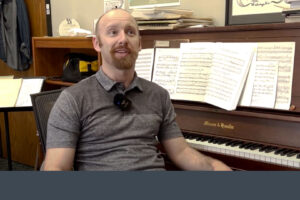Bill Minutaglio, clinical professor in the School of Journalism, is the author of several politically themed books, including “First Son: George W. Bush and The Bush Family Dynasty” and “The President’s Counselor: The Rise to Power of Alberto Gonzales.” He also writes for the Texas Observer.
Some political insiders like to say that the real election races don’t begin until after Labor Day. That the long, sometimes interminable, slog to November elections doesn’t matter much until we round the home stretch in September.
To extend the sports analogy: It’s a lot like what some people say about a basketball game – the real contest actually uncorks in the fourth quarter, with increasing urgency, with the clock ticking down minute by minute.
And, of course, with that … sharpened focus … comes sharpened elbows. The various campaigns in Texas are now resorting to edgier ads, bolder accusations, brasher assertions about what “their poll numbers” are showing.
It is, of course, nothing new. Political spin doctors all know that the last few weeks before voters go to the polls are akin to hand-to-hand combat. (When George W. Bush was governor of Texas, he talked about the buildup to “Reality Day” – his nickname for Election Day.)
But there is something different this time around. It is quantifiable: Because of economic cuts, there are fewer foot soldiers in the media – ones representing bigger, mainstream venues – and that means that there are more and more under-reported political stories, issues and even individual contests. And maybe even more of a chance for campaign stories to turn into he-said-she-said stories – ones missing the meat of real ideas, real debate, real answers.
Of course, the media has long been criticized for not focusing on the serious matters at the heart of political campaigns. The admonition goes something like this: Many political reporters will just do “horserace coverage” of Bill White, Rick Perry and anyone else. Reporters are content to dutifully tell us who is ahead, who has a projected margin of victory and who is stumbling to the back of the pack.
Having covered politics in Texas for a number of years, I’ve seen the media succumb to that modus operandi. But I’ve also seen many great Texas reporters drill down on a candidate’s policies and positions. The good ones would go really deep – they used to head out across the state to see what a candidate’s professed campaign pledge would do to, or for, Texas. They would scour a politician’s statements, business dealings, military record (or lack thereof) and come to some hard, objective truths.
And, when they had time, they knew how important it was to thoroughly examine the so-called “down ballot” races – the races that are seemingly “less sexy” than the big sprint for the governor’s office: The contests for the lieutenant governor, the Texas Railroad Commission, the Attorney General, etc.
Those reporters would also be looking at countless, critical things that are still defining Texas right now: children’s health insurance, environmental oversight, restructuring the social services system, privatization of government functions, regulation of public utilities, the future of family farms, DNA testing and death row inmates … and on and on.
But, now, very regrettably, the “down ballot” races are increasingly uncovered. And so are those defining issues.
Simply put, the electorate is not being as informed as it once was. Media operations have scaled back. And so, the public has to work harder than ever to do its own form of citizen journalism as we steam toward November: It will have to dissect the existing news accounts like never before, and it will have to be as inquisitive and dogged as any good reporter.
Visit the mid-term elections blog series home page for a complete lineup of faculty experts’ analyses.



